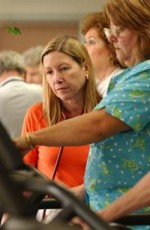Pioneering research on women and heart disease

Two months after surgeons put four stints in her heart, Diane Campbell rehabs by walking on a treadmill in a room with about 10 other people. Some are other patients. Some are doctors. Some are nurses. None are men.
Campbell, like the seven other women exercising in the room, is part of cardiac rehabilitation program created by USF researcher Theresa Beckie and geared specifically toward women. The program – which emphasizes flexibility, support and gentle persuasion – has one rigorous rule: No boys allowed.
“I can’t imagine having a heart attack, and not having a program like this available,” the 61-year-old Campbell said. “There’s a comradery here, and that’s so helpful.”
Women, who are nearly twice as likely to die from a second heart attack as men, have had difficulty in typical cardiac rehabilitation programs, Beckie said. The traditional programs have often marginalized women, who are usually older than men when they enter the program and respond differently to a top-down, prescriptive approach.
Beckie’s program – begun in 2003 and funded through the National Institutes of Health (NIH) as part of a $1.5 million research study – represents a new way of thinking about women’s heart health, and the psychological and physical factors that make their experience different from that of men. The study is the first of its kind in the country.
“It’s more of a spirit ofhelping to understand what’s important to them and how it fits into their lifestyle, rather than our traditional way of lifestyle management, which is ‘Ms. Jones, don’t you know that you need to reduce your cholesterol, you need to exercise more, and you need to lose 30 pounds. And of course you need to stop smoking'” said Beckie, who is also a professor of nursing. “This sets up resistance. They’re demoralized.”
Women face significant barriers to recovering from heart disease, Beckie said. Compared to men, they are often older, have more responsibilities to family and have poorer insurance coverage.
Beckie’s program, which will enroll nearly 400 women before its completion in 2008, uses a combination of counseling, education and physical therapy to help women recovering from heart trauma make needed lifestyle changes gradually. It emphasizes coping strategies for dealing with the often overwhelming emotional and physical aspects of cardiac rehab.
Though Beckie said she can’t make a definite determination about the effectiveness of her program until its completion, some of her results so far have been encouraging. Attendance in the motivational group outstrips attendance in the traditional group by 30 percent, Beckie said.
“I really hope (this study) has some public health significance,” Beckie said. “Anything I can do to bring more attention to women’s health is important, because we already know men. Heart disease has been a man’s disease for far too long.”
A Stealthy Killer
Jeanette Low thought her shortness of breath was caused by just another asthma attack. Days later, she lay in a hospital bed following bypass surgery for a heart attack.
“Afterwards, I kept thinking that maybe all those other times I thought I was having an asthma attack, I was really having a (mild) heart attack,” the 50-year-old Low said.
Like many women who suffer from heart attacks, Low’s symptoms were subtle, lacking the same punch more characteristic of men’s heart attacks.
“These women don’t get the Hollywood heart attacks, the crushing chest pain on the tennis court kind,” Beckie said. “But they are at very high risk for another event unless they change their lifestyle.”
Low began Beckie’s program nearly four months ago and is now in the final phase. The primary phase of the program lasts three months and consists of 36 electrocardiogram-monitored exercise sessions and 10 education counseling sessions. During exercise, the patient’s weight, blood pressure and heart rate is recorded. Each woman is also individually assessed to determine how mentally ready she is to make necessary lifestyle changes.
The program is an extension of research that first began when Beckie noticed the failure of traditional rehabilitation programs to address the needs of women 25 years ago as a critical care nurse in Canada. Many of the women she treated were sick and performing much worse than the men.
“While the numbers of women were small compared to the number of men, I started to get interested in this whole issue of women and heart disease,” Beckie said. “Everyone knew about the men, but where were the women in all of this?”
Beckie hopes not only to help these women, but also to encourage them to spread their knowledge about heart health to their daughters and granddaughters.
“I tell them if there’s one thing they can do after this, it’s to help educate their grandchildren so they don’t have to go through this all,” Beckie said. “If I can save one woman, or two, or hundreds, that’s what I want to do.”






